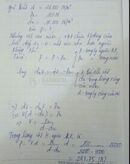Hãy nhập câu hỏi của bạn vào đây, nếu là tài khoản VIP, bạn sẽ được ưu tiên trả lời.

a) ĐKXĐ: \(\hept{\begin{cases}2x-2\ne0\\x^2-1\ne0\\2x+2\ne0\end{cases}}\)\(\Leftrightarrow\hept{\begin{cases}x\ne1\\x\ne-1\end{cases}}\)
b) bạn rút gọn, biểu thức sẽ bằng 4
=> giá tri của biểu thức sẽ không phụ thuộc vào biến x
tôi vướng ở câu b giải cứ bị lẫn giải ra vẫn có biến x giải họ tôi cái

a/. ĐKXĐ : (x-1)(x+1) # 0 => x # 1 hay x # -1
b/. \(B=\left[\frac{\left(x+1\right)^2}{2\left(x-1\right)\left(x+1\right)}+\frac{3.2}{2\left(x-1\right)\left(x+1\right)}-\frac{\left(x+3\right)\left(x+1\right)}{2\left(x-1\right)\left(x+1\right)}\right].\frac{4\left(x-1\right)\left(x+1\right)}{5}\)
\(B=\frac{x^2+2x+1+6-x^2-4x-3}{2\left(x-1\right)\left(x+1\right)}.\frac{4\left(x-1\right)\left(x+1\right)}{5}\)
\(B=\frac{2\left(4-2x\right)}{5}\)
Em xem lại đè nhé. Đề như vậy thì sẽ ko rút gọn đc hết x trên tử. nên B vẫn phụ thuộc vào biến x.
chao cac bạn và a chi nếu đề sửa lai vây thi minh làm thế nào ( x+1/2x-2 + 3/x^2+1 - x+3/2x+1 )* (4x^2 -1)/5

Bài 1
Ta có : \(\frac{2x+2}{x^2-1}=0\)ĐK : \(x\ne\pm1\)
\(\Leftrightarrow2x+2=0\Leftrightarrow x=-1\)( ktm )
Bài 2 :
Ta có : \(\frac{2x+3}{-x+5}=\frac{3}{4}\)ĐK : \(x\ne5\)
\(\Leftrightarrow8x+12=-3x+15\Leftrightarrow11x=3\Leftrightarrow x=\frac{3}{11}\)
Vậy phương trình có tập nghiệm là S = { 3/11 }

thiếu đề : \(\left(\frac{x+1}{2x-2}+\frac{3}{x^2-1}-\frac{x+3}{2x+2}\right).\frac{4x^2-4}{5}.\)
Bài 2 :
a, Để \(B=\left(\frac{x+1}{2x-2}+\frac{3}{x^2-1}-\frac{x+3}{2x+2}\right)\frac{4^2-4}{5}\)
\(\Rightarrow\hept{\begin{cases}2x-2\ne0\\x^2-1\ne0\\2x+2\ne0\end{cases}}\Rightarrow\orbr{\begin{cases}x\ne1\\x\ne-1\end{cases}}\)
b,\(B=\left(\frac{x+1}{2x-2}+\frac{3}{x^2-1}-\frac{x+3}{2x+2}\right)\frac{4x^2-4}{5}\)
\(B=\left[\frac{x+1}{2\left(x-1\right)}+\frac{3}{\left(x+1\right)\left(x-1\right)}-\frac{x+3}{2\left(x+1\right)}\right].\frac{4\left(x-1\right)\left(x+1\right)}{5}\)
\(B=\left[\frac{x^2+2x+1}{2\left(x-1\right)\left(x+1\right)}+\frac{6}{2\left(x-1\right)\left(x+1\right)}-\frac{x^2+2x-3}{2\left(x-1\right)\left(x+1\right)}\right]\frac{4\left(x-1\right)\left(x+1\right)}{5}\)
\(B=\left[\frac{x^2+2x+1+6-x^2-2x+3}{2\left(x-1\right)\left(x+1\right)}\right]\frac{4\left(x-1\right)\left(x+1\right)}{5}\)
\(B=\frac{4}{2\left(x-1\right)\left(x+1\right)}.\frac{4\left(x-1\right)\left(x+1\right)}{5}\)
\(B=\frac{8}{5}\)
=> giá trị của B ko phụ thuộc vào biến x
bài 1
=\(^{\left(2x+1\right)^2+2\left(2x+1\right)\left(2x-1\right)+\left(2x+1\right)^2}\)
=\(\left(2x+1+2x-1\right)^2\)
=\(\left(4x\right)^2\)
=\(16x^2\)
Tại x=100 thay vào biểu thức trên ta có:
16*100^2=1600000

a) A= \(\frac{3x^2+5x-2}{3x^2-7x+2}=0\)
\(ĐK:3x^2-7x+2\ne0\)
\(\Leftrightarrow\orbr{\begin{cases}x\ne\frac{1}{3}\\x\ne2\end{cases}\left(^∗\right)}\)
=> 3x2 + 5x + 2 =0
<=> 3x2 + 3x + 2x +2 = 0
<=> 3x .( x + 1 ) + 2 .( x + 1 ) =0
<=> ( x + 1 )(3x + 2 ) =0
<=> \(\orbr{\begin{cases}x+1=0\\3x+2=0\end{cases}\Leftrightarrow\orbr{\begin{cases}x=-1\\x=\frac{-2}{3}\left(t/m\left(^∗\right)\right)\end{cases}}}\)
Vậy x = -2/3
b) \(B=\frac{2x^2+10x+12}{x^3-4x}=0\left(ĐK:x\ne0;x^2\ne4\Leftrightarrow x\ne0;x\ne\pm2\right)\)
<=> 2x2+ 10x + 12 = 0
<=> x2 + 5x+ 6 =0
<=> ( x + 2 ) ( x + 3 ) =0\(\Leftrightarrow\orbr{\begin{cases}x=-2\left(L\right)\\x=-3\left(t/m\right)\end{cases}}\)
Vậy x = -3
c)\(C=\frac{x^3+x^2-x-1}{x^3+2x-5}=0\) \(ĐK:x^3+2x-5\ne0\left(^∗\right)\)
<=> x3 + x2 -x -1 =0
<=> ( x - 1 )(x2 + 2x + 1 )
<=> ( x-1 ) (x+1)2 = 0
<=> \(\orbr{\begin{cases}x-1=0\\x+1=0\end{cases}\Leftrightarrow\orbr{\begin{cases}x=1\left(t/m\left(^∗\right)\right)\\x=-1\left(t/m\left(^∗\right)\right)\end{cases}}}\)
Vậy x = { 1 ; -1 }
a) A = \(\frac{3x^2+5x-2}{3x^2-7x+2}=0\) (ĐKXĐ: x khác 1/3, x khác 2)
<=> 3x^2 + 5x - 2 = 0
<=> (3x - 1)(x + 2) = 0
<=> 3x - 1 = 0 hoặc x + 2 = 0
<=> 3x = 1 hoặc x = -2
<=> x = 1/3 (ktm) hoặc x = -2 (tm)
=> x = -2
b) B = \(\frac{2x^2+10x+12}{x^3-4x}=0\) (ĐKXĐ: x khác 0, x khác +-2)
<=> \(\frac{2\left(x^2+5x+6\right)}{x\left(x^2-4\right)}=0\)
<=> \(\frac{2\left(x+2\right)\left(x+3\right)}{x\left(x-2\right)\left(x+2\right)}=0\)
<=> \(\frac{2\left(x+3\right)}{x\left(x-2\right)}=0\)
<=> 2(x + 3) = 0
<=> x + 3 = 0
<=> x = -3
c) C = \(\frac{x^3+x^2-x-1}{x^3+2x-5}=0\) (ĐKXĐ: x khác x^3 + 2x - 5)
<=> \(\frac{x^2\left(x+1\right)-\left(x+1\right)}{x^3+2x-5}=0\)
<=> \(\frac{\left(x+1\right)\left(x^2-1\right)}{x^3+2x-5}=0\)
<=> \(\frac{\left(x+1\right)\left(x-1\right)\left(x+1\right)}{x^3+2x-5}=0\)
<=> (x + 1)(x - 1) = 0
<=> x + 1 = 0 hoặc x - 1 = 0
<=> x = -1 hoặc x = 1



Bài 1:
ĐKXĐ của phân thức đã cho là:
\(x^2-4\neq 0\Leftrightarrow (x-2)(x+2)\neq 0\Leftrightarrow x\neq \pm 2\)
Bài 2:
a)
ĐKXĐ: \(x^3-4x\neq 0\Leftrightarrow x(x-2)(x+2)\neq 0\Leftrightarrow x\neq \pm 2; x\neq 0\)
Để phân thức đã cho bằng $0$ thì:
\(2x^2+10x+12=0\)
\(\Leftrightarrow x^2+5x+6=0\)
\(\Leftrightarrow (x+2)(x+3)=0\Rightarrow \left[\begin{matrix} x=-2\\ x=-3\end{matrix}\right.\)
Kết hợp với ĐKXĐ suy ra $x=-3$
b)
ĐKXĐ: \(x^3-2x^2+x\neq 0\Leftrightarrow x(x-1)^2\neq 0\Leftrightarrow x\neq 0; x\ne 1 \)
Để phân thức đã cho bằng $0$ thì:
\(x^3+x^2-x-1=0\)
\(\Leftrightarrow x^2(x+1)-(x+1)=0\)
\(\Leftrightarrow (x^2-1)(x+1)=0\)
\(\Leftrightarrow (x-1)(x+1)^2=0\Rightarrow \left[\begin{matrix} x=1\\ x=-1\end{matrix}\right.\)
Kết hợp với ĐKXĐ suy ra $x=-1$